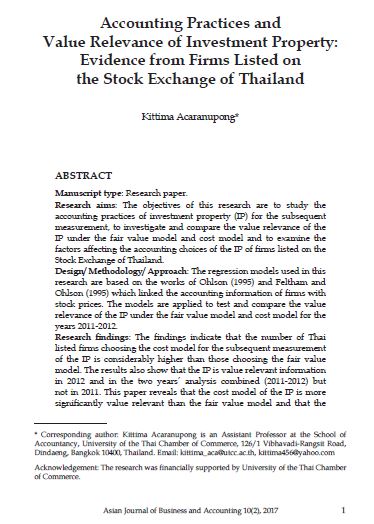Accounting Practices and Value Relevance of Investment Property: Evidence from Firms Listed on the Stock Exchange of Thailand
Main Article Content
Abstract
Manuscript type: Research paper.
Research aims: The objectives of this research are to study the
accounting practices of investment property (IP) for the subsequent
measurement, to investigate and compare the value relevance of the
IP under the fair value model and cost model and to examine the
factors affecting the accounting choices of the IP of firms listed on the
Stock Exchange of Thailand.
Design/ Methodology/ Approach: The regression models used in this
research are based on the works of Ohlson (1995) and Feltham and
Ohlson (1995) which linked the accounting information of firms with
stock prices. The models are applied to test and compare the value
relevance of the IP under the fair value model and cost model for the
years 2011-2012.
Research findings: The findings indicate that the number of Thai
listed firms choosing the cost model for the subsequent measurement
of the IP is considerably higher than those choosing the fair value
model. The results also show that the IP is value relevant information
in 2012 and in the two years’ analysis combined (2011-2012) but
not in 2011. This paper reveals that the cost model of the IP is more
significantly value relevant than the fair value model and that the accounting choices of the IP are significantly affected by profitability
and size.
Theoretical contribution/ Originality: This paper suggests that the
accounting information of the IP is useful for valuing securities in
the Thai stock market. The outcome also supports the bonus plan
hypothesis under the Positive Accounting Theory (PAT) where
higher earnings firms would predominantly use the cost model for
the IP. It is further noted that larger firms in Thailand are more likely
to use the fair value model for the IP, thereby supporting the size
hypothesis.
Practitioner/ Policy implication: The outcome drawn from this paper
provides information to the Federation of Accounting Professions
(FAP) in Thailand when deliberating on the revision of the accounting
standards related to fair value measurements. The FAP may consider
taking steps to increase the reliability of fair value so as to encourage
firms to select the fair value model for use. The results can also act
as a catalyst for the Securities and Exchange Commission (SEC)
such that when issuing the regulation on fair value disclosures,
transparency and the reliability of financial statements are further
increased.
Research limitation/ Implication: This paper examines the value
relevance of only recognised IPs in the Statements of Financial
Position. Future studies therefore, may need to investigate the relative
value relevance of fair value disclosures in the notes to financial
statements compared with the recognised fair value amounts of
investment properties.
Keywords: Accounting Practices, Investment Property, Value Relevance
JEL Classification: M41, G14
